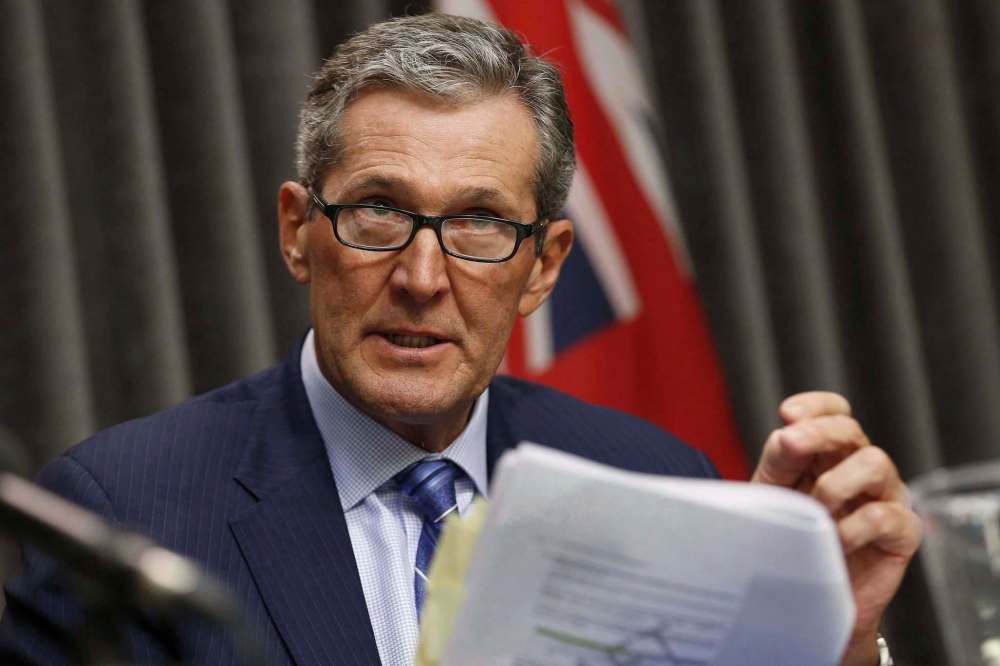Health-care overhaul a bitter pill
'Pallister's prescription' for an ailing system voted top local story
Advertisement
Read this article for free:
or
Already have an account? Log in here »
To continue reading, please subscribe:
Monthly Digital Subscription
$1 per week for 24 weeks*
- Enjoy unlimited reading on winnipegfreepress.com
- Read the E-Edition, our digital replica newspaper
- Access News Break, our award-winning app
- Play interactive puzzles
*Billed as $4 plus GST every four weeks. Offer only available to new and qualified returning subscribers. Cancel any time.
Read unlimited articles for free today:
or
Already have an account? Log in here »
Hey there, time traveller!
This article was published 30/12/2017 (2589 days ago), so information in it may no longer be current.
It was a bold move that could pay big political dividends for the Progressive Conservatives — or threaten their chances at re-election in 2020.
The Pallister government stunned Winnipeggers in April, when it announced the city’s hospital system would undergo major surgery.
It was part of an elaborate overhaul of a health system that, the PCs believed, had gained too much bureaucratic weight and was in need of a makeover.

Three city hospital emergency rooms — at Victoria, Seven Oaks and Concordia hospitals — were to be closed. Misericordia Health Centre would lose its urgent care centre. The idea was to concentrate emergency room resources at Health Sciences Centre, Grace General Hospital and St. Boniface Hospital in a bid to create operating efficiencies and reduce wait times.
Seven Oaks and Victoria hospitals would see their ERs turned into urgent care centres.
At a news conference, Health Minister Kelvin Goertzen declared Winnipeg’s health-care system “broken.” He said the measures being implemented were “evidence-based” and followed consultations with hundreds of stakeholders.
“Doing nothing was not an option,” he said. “Things were not going to improve if we didn’t change things. We just couldn’t continue to pour money into a system that wasn’t working.”
The massive health reorganization, dubbed “Pallister’s prescription” by the Free Press, is the readers’ choice as local news story of the year, edging out such significant stories as Churchill’s struggle with the loss of its rail line, the fentanyl crisis, the revelation of past domestic violence charges against Wab Kinew and the discovery of 21-year-old Christine Wood’s body nearly 10 months after she went missing in Winnipeg.
The announcement sparked widespread concern about a loss of community health services. Health professionals and support workers feared job loss and/or upheaval from having to transfer to a new workplace.
While the government maintained that its primary objective was to improve health service, it soon became apparent that cost control was also a significant goal.
Three weeks after the initial announcement, 500 members of the Manitoba Nurses Union and other labour supporters descended upon the Manitoba Legislative Building to voice their displeasure with the Pallister government’s plan.
“Call it what it is, these are front-line service cuts. You’ve broken your promise and nurses won’t stand for it,” union president Sandi Mowat said, referring to the premier.
The loss of Misericordia’s urgent care centre became a rallying cry for many who opposed the government’s proposed changes. The Free Press learned months after the announcement that the institution’s top boss had been left in the dark about the province’s plans.
“We didn’t have any prior warning,” outgoing Misericordia president Rosie Jacuzzi said.
Health-care workers, doctors, opposition politicians and members of the general public raised concerns about some of the planned reforms. Demonstrations at health-care sites in Winnipeg were a common sight in 2017.
With health taking up an ever-increasing piece of the provincial spending pie — and with annual federal funding increases about to be cut in half — the Progressive Conservatives ordered health bureaucrats to find savings throughout the system.
The Winnipeg Regional Health Authority was tasked with finding $83 million in budget savings during the year. Winnipeggers learned that four Quick Care Clinics would close and there would be cuts to outpatient physiotherapy and other services. Regional health authorities in other parts of Manitoba were also directed to find savings. Even the smallest cost items — blankets, washcloths and adult diapers — were scrutinized.
A new entity, Shared Health Services, was created to centralize some regional health authority functions, in a bid to find even more efficiencies.
The reverberations of the health reforms launched by the Pallister government a year into its mandate are likely to be felt for some time. The political risks for the PCs are great.
“People are very sensitive to health-care reform,” said Christopher Adams, a political scientist at St. Paul’s College. “Everybody has an opinion about health care.”

The premier’s priority is eventually to balance the provincial budget, Adams said. To do that, he needs to rein in health spending, which accounts for 40 per cent of the budget.
Pallister has time to demonstrate that his plan is working before the next election, Adams said.
“He still has a couple of years till the next election. He’s making the tough decisions now.”
But it’s anybody’s guess as to how successful the government will be in effecting change — and selling it to the public — by the fall of 2020, when Manitobans are scheduled to go to the polls.
If the Tories can reduce the size of the provincial deficit while noticeably improving ER waits and shrinking lineups for joint replacement and cataract surgeries, they will have a great story to sell to voters. But if they succeed in slashing the deficit without improving services, they will leave themselves vulnerable to a challenge from either the Liberals or the NDP.
Paul Thomas, professor emeritus of political studies at the University of Manitoba, said as the far-reaching reforms are implemented, there are bound to be unforeseen consequences “and even some screw-ups.”
He said he’s spoken to senior health-system officials who worry the changes are being implemented too quickly.
Initially, the province and the WRHA indicated that the reforms would be implemented within six to 24 months. It soon became apparent that the changes were going to happen sooner rather than later. Only recently, at the urging of a provincial task force, did the government agree to delay the planned closure of the Concordia and Seven Oaks ERs.
Thomas said he’s been told by senior officials that the fast pace of reform has created “anxiety, uncertainty, confusion and (a) decline in morale” within the health system.
“You can’t effect large-scale change under those conditions. There has to be enough assurance that things will work out, that you’ll get through a difficult transition period and come out better on the other side,” he said.
Thomas said the government and the WRHA face an enormous communications challenge — not only with a skeptical public, but also within the health system. “It takes careful planning and execution, and I’m not sure they can pull that off,” he said.
He said a “more staged approach” to reform — one in which the public is prepared for change at each step along the way — would make more sense.
“That takes more patience, but you get more buy-in from the people who have to deliver what the management consultants have promised,” he said.
larry.kusch@freepress.mb.ca

Larry Kusch
Legislature reporter
Larry Kusch didn’t know what he wanted to do with his life until he attended a high school newspaper editor’s workshop in Regina in the summer of 1969 and listened to a university student speak glowingly about the journalism program at Carleton University in Ottawa.
Our newsroom depends on a growing audience of readers to power our journalism. If you are not a paid reader, please consider becoming a subscriber.
Our newsroom depends on its audience of readers to power our journalism. Thank you for your support.
History
Updated on Sunday, December 31, 2017 5:02 PM CST: Corrects Christopher Adams' affiliation.



